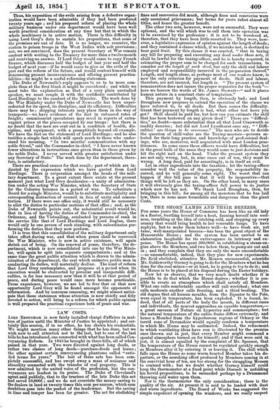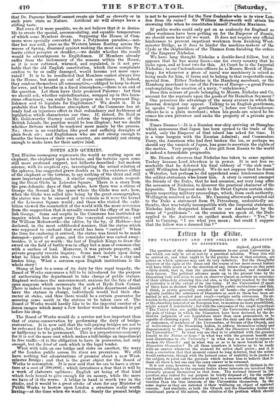THE SHORN LAMBS AND THEIR BREEZES.
FOR some years the House of Commons has been like an old lady in a fluster, bustling herself into a heat, fanning herself into cool- ness, trembling at the idea of catching cold, and stopping up every cranny that would bring health to her venerable lungs. To have zephyrs, but to make them behave well—to have fresh air, yet tame, well-manipulated breezes—has been the great object of the Honourable House ; and the system has been carried to an elaboration laughable for its extravagance in intricacy and ex- pense. The House has spent 200,000/. in establishing a steam-en- gine above the Members, and two below them, to pump air out and in ; and they complain that they are only the more uncomfortable —so uncomfortable, indeed, that they pine for new experiments. Dr. Reid abolished, attentive Mr. Reason unsuccessful, scientific Mr. Goldsworthy Gurney is going to do for the Members what he has done for the coal-mines—or at least, he is going to try to do it; and the House is to be placed at his disposal during the Easter holidays.
Now let us observe, that we very much doubt whether it is possible to do that which the House depires ; whether it is pos- sible to create an atmosphere which shall satisfy all Members. What one calls comfortable another will call wretched ; what one calls moderate another calls freezing, and a third broiling. The old dogma that all human mouths from the Equator to the Pole, were equal in temperature, has been exploded. It is found, in- deed, that of all parts of the body the mouth, in different races and individuals, the nearest approaches an equable temperature,— a great sarcasm of Nature on hypocrisy and commonplace ; but the natural temperature of the entire frame differs extremely, and hence a Member from the hyperborean regions of Orkney or the torrid zone of Devonshire would equally condemn a temperature to which Mr. Hume may be acclimated. Indeed, the refinement to which ventilating ideas have run is illustrated by the promise once thrown out in jest, that every Member might command a special atmosphere turned on for himself; and if that were said in jest, it is almost equalled by the complaint of Mr. Spooner, that the temperature of the House cannot be regulated quickly enough as Members alter it by entering it or leaving it. The chill which falls upon the House as some warm-hearted Member takes his de- parture, or the scorching effect produced by Members coming in at the convivial hour of ten, are too strong for the struggling Meason to contend with ; but we doubt whether Gurney himself could keep the thermometer at a fixed point while Disraeli is inifolding his fervid propositions, to be succeeded perhaps by a Drummond throwing cold water upon them. Nor is the thermometer the only consideration ; there is the quality of the air. At present it is said to be loaded with dust and worse ingredients. The Board of Works has suggested the simple expedient of opening the windows, and we really suspect that Dr. Payerne himself cannot create air half so cleverly or in such pure state as Nature. Artificial air will always have a stifling taste.
But even if it were possible, we do not believe that it is desira- ble to create the special, accommodating, and equable temperature of which some Members dream. Supposing the House of Com- mons were specially converted into a Polynesian paradise,—nei- ther hot nor cold, pure as the Western breeze floating across the waves of Spring, disarmed against making the most sensitive Sy- barite either perspire or shudder,—we doubt whether the result would be advantageous to Englishmen. If Members already suffer from the inclemency of the seasons within the House, as it is now cottoned, warmed, and regulated, is it not pro- bable that the old English constitution, which these complaints confess to be so sadly damaged, would become yet more ener- vated? It is to be recollected that Members cannot always live in the House, but must go out of doors sometimes. If, indeed, they confess themselves all consumptive,—obliged to keep in-doors for ever, and to breathe in a fixed atmosphere,—there is an end of the question. Let them have their promised Palermo : but then we should ask, whether valetudinarians, wrapped up in this luxu- rious effeminacy, can really be the proper men to represent Eng- lishmen and to legislate for Englishmen? We doubt it. It is probable that the hothouse atmosphere of the Commons has al- ready had an injurious effect in that redundancy and feebleness of legislation which characterize our time. If, indeed, Dr. Reid or Mr. Goldsworthy Gurney could reform the temperature of the British Islands, the position would be less illogical; but we doubt whether Britons would be rendered more manly by the process. No; there is no ventilation like good and sufficing draughts of plain fresh air ; and Englishmen who are not strong enough to breathe the breezes of their own country, are certainly not strong enough to make laws for their native land.



























 Previous page
Previous page